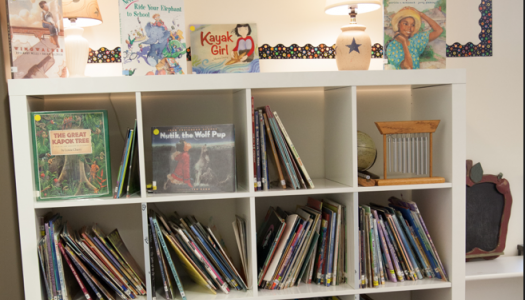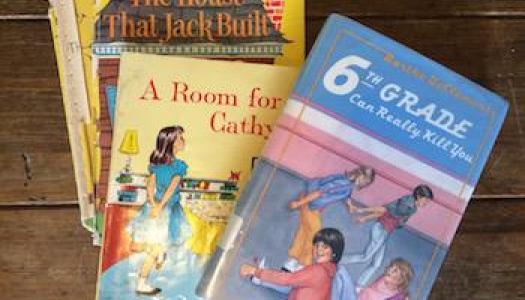10 Ways to Get Books into Your Classroom and Readers’ Hands! Part I
Join Our Community
Access this resource now. Get up to three resources every month for free.
Choose from thousands of articles, lessons, guides, videos, and printables.
I’ve often referred to libraries as the crown jewels of the classroom, but I know that some of those jewels have a lot more luster and a lot more books than others. If your bookshelves are adorned with beautiful, high-interest books for children of varying abilities, you must treasure that jewel of a library. However, if your shelves have little on them besides dust, here are a few suggestions to get books into the classroom and into readers’ hands.
-
Book Drive: At your school, there may be students who are working on service projects. Connect with them, and share your interest in a school book drive. Or, contact a local high school to see if any students are interested in organizing a book drive for your school. Some might be recent graduates of your school or have family members who attend. Encourage them to consider a school book drive as a worthy cause that will benefit many children.
-
Book Orders: Many school trade-book publishers offer bonus points based on classroom order quantities. When your students place orders, be sure to investigate how to use the points to get more books. If your classroom order is small, team up with other teachers, and split the bonus points with participating colleagues.
-
 Bookroom: If your school has sets of books or guided reading packs that are not being used, divvy up the books to be distributed to individual classrooms. Explore some of the science and/or social studies kits that may no longer be in use. Sometimes, they include sets of books that can be broken apart and distributed to classrooms. Look for single copies of magazines that can be added to your classroom library. Or, remove interesting articles from that lone magazine, and place them in labeled folders based on topic.
Bookroom: If your school has sets of books or guided reading packs that are not being used, divvy up the books to be distributed to individual classrooms. Explore some of the science and/or social studies kits that may no longer be in use. Sometimes, they include sets of books that can be broken apart and distributed to classrooms. Look for single copies of magazines that can be added to your classroom library. Or, remove interesting articles from that lone magazine, and place them in labeled folders based on topic. -
Flea Markets/Garage Sales/Moving Sales: Be on the lookout for children’s books during these types of sales. Enlist your relatives’ help so that they can look in their neighborhoods, too. Let your family and friends know that you are always appreciative of children’s books or magazines that they might otherwise discard.
-
Grade-Level Share: Since students are always thrilled to see some new additions to the classroom library, swap books with your grade-level colleagues. Start small by exchanging a dozen or so, and keep a list of books that were traded so that they can be returned to the original classroom library. Be aware that a couple may need to be replaced if they are lost. Exchange leftover copies of grade-level classroom magazines with other teachers to meet the varying needs of readers. For example, a lower-grade teacher can offer them to more capable readers, and an upper-grade teacher can use them to support struggling readers.
-
In Honor Of: Often families, volunteers, and staff members want to remember special events such as an addition to the family, a birthday, a graduation, or a retirement by donating a book. You can discuss this option during a school literacy night. Display bookplates that would-be donors can place in the book to identify the honoree.
-
Internet Resources: Donors Choose is a free service where teachers can post a classroom need that they would like to have funded. Interested donors can contribute to funding the request for books and/or other classroom materials. Reading Rockets lists organizations that may be potential sources of books for your classroom library. Finding Free Books for the Classroom from the National Education Association will also direct you to sources for books.
-
Library Book Sales: Check out your public library website, and put the date of the next library used-book sale on your calendar. There are bound to be several inexpensive books, both fiction and nonfiction, that you can add to your classroom library collection.
-
Library Book Bags: Get to know your public library school liaison. Investigate how to get teacher book bags that can be checked out for a period of time. This will give your students more access to books. Remember to plan ahead and make your request with ample lead time for the library staff to fulfill your request. Find out how you can get a teacher library card that will allow you to check out materials even if you do not live in the community.
-
Literacy Night Book Donation and Raffle: Before your first open house, literacy night, or family movie night, arrange for a raffle. Write a note to parents telling them they will receive a raffle ticket for every gently used book they donate. Encourage attendance, and offer the prize of a bookstore gift certificate to the raffle winner.
References:
Donors Choose. (2016).Teachers: How it works. Retrieved from https://www.donorschoose.org/teachers
National Education Association. (2015). Finding free books for the classroom. Retrieved from http://www.nea.org/grants/finding-free-books.htm
Walker, R. (2016). Search free books. Reading Rockets. Retrieved from http://www.readingrockets.org/article/search-free-books








